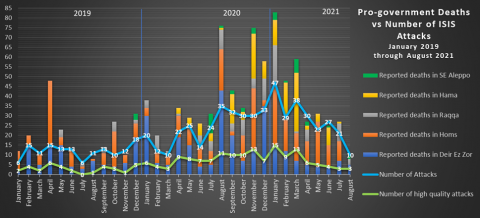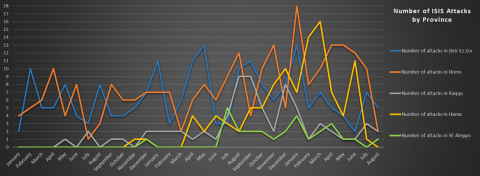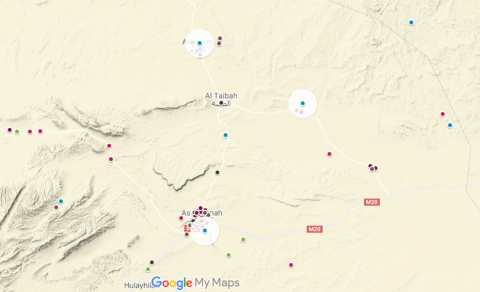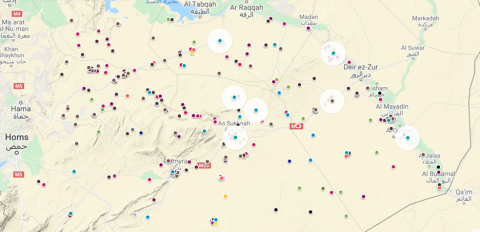Fact:
On May 8, 2019, Taliban insurgents detonated an explosive-laden vehicle and then broke into American NGO Counterpart International’s offices in Kabul. At least seven people were killed and 24 were injured.
Following is the August 2021 installment of “ISIS Redux: The Central Syria Insurgency,” a monthly chronicle of attacks by the terrorist group ISIS in central Syria. Previous editions of ISIS Redux can be viewed through the following links: July, June, May, April, March, February, and January 2021; and December, November, October, September, August, July, June, May, and April 2020. A full background and analysis of ISIS’s resurgence in Syria, including its methodology, can also be explored here, here and here.
ISIS militants carried out at least 10 confirmed attacks in August, killing at least nine pro-Assad regime fighters and two civilians, while wounding at least three others in the Homs, Deir Ez Zor, Raqqa, and Aleppo governorates. The number of confirmed ISIS attacks dropped to its lowest point since March 2020, continuing a decline that began following a high of 47 attacks in January 2021. High quality* attacks matched July’s total of three, compared to a high of 15 in January. ISIS attacks have completely ended in Hama—where militants carried out only one attack in July—and continued to be concentrated in Deir Ez Zor for the second month in a row.

Only one attack in August targeted civilians, compared to two in the previous month. Both attack lethality and the number of total casualties dropped significantly in August. Total casualties reached a level not witnessed since November 2019. However, ISIS cells once again succeeded in killing a pro-regime commander.
The increased reliance on mines and IEDs that began in May 2021 and rose sharply in June and July shifted slightly in August. Only three confirmed mine/IED attacks compared to four confirmed small arms attacks and three attacks of unknown means took place during the month. This shift in attack style may indicate the beginning of a shift in ISIS posture, as it is possible that cells have successfully finished relocating and reestablishing themselves in new areas of operation. However, the sample size for August is too small to draw definitive conclusions.
Confirmed attacks in August in Homs (2) dropped significantly following two months of gradual decline. While attacks in Deir Ez Zor (5) dropped slightly from last month, activity in the governorate is still higher than it was during spring. Meanwhile, ISIS cells continue to operate a low-level but consistent insurgency in south Raqqa (2) and south Aleppo (1) while appearing to have completely abandoned eastern Hama for the time being. ISIS cells conducted a high quality attack in Raqqa for the second month in a row, as well as one high quality attack each in south Aleppo and Deir Ez Zor.

Hama
There was no confirmed ISIS activity in Hama in August. The last attack in the governorate occurred on July 8. A locally deployed regime fighter told this author last month that both of the main ISIS cells had fully withdrawn from the governate between June and July, and a second soldier interviewed this month confirmed that his battalion had seen no trace of ISIS during a two week mission across the area in the first half of August. This is the first month without ISIS activity in Hama since March 2020, when ISIS was only just beginning to re-establish itself in the governorate.
Homs
ISIS activity in Homs dropped significantly as regime forces continued to expand patrols and maintain extensive garrisons across the governorate. On August 6, regime pages reported clashes between security forces and insurgents along the highway outside Sukhnah. On August 15, ISIS claimed it downed a Russian Orlan drone, which according to the pro-government militia the National Defense Forces (NDF) had been operating over Shanhas on the southeastern Kawm front. On August 26, further activity was reported around Kawm, with militants conducting a minor small arms attack on regime militias in the area and attempting to down another observation drone the following day.
Unlike in June and July, when ISIS activity in Homs was reduced but still occurred across the governorate, ISIS cells appeared to focus almost exclusively on the Kawm-Sukhnah front in August. This may hint at the importance ISIS places on opening the terrain around Kawm, which sits strategically on the highway connecting Raqqa to Homs. However, it seems unlikely that ISIS will dislodge regime forces here anytime soon due to the high number of regime units deployed and constant Russian air support.

Deir Ez Zor
As in July, Deir Ez Zor continued to see the most important developments of the ISIS Badia insurgency. Activity here has dropped significantly since January 2021 as regime, Russian, and Iranian forces moved to dislodge ISIS cells first around Jabal Bishri and then in the Mayadin countryside. By June, ISIS had reportedly moved hundreds of fighters out of the province and into Iraq. By mid-July, regime sources claimed that new ISIS cells had entered the governorate, triggering a notable increase in attacks. While this author previously assumed the new fighters had returned from Iraq, it is also possible that some of these cells consist of fighters who left east Hama in June and early July.
Two notable attacks occurred in Deir Ez Zor in August. First, ISIS fighters attacked an NDF/Syrian Arab Army (SAA) position near the town of Musarib in west Deir Ez Zor on August 12. This area had been the scene of intense ISIS attacks throughout the fall of 2020. While this attack was reportedly repelled, it may portend a return of some cells to the previously “cleared” part of the governorate. Second, on August 25, a pro-regime Liwa al-Quds commander was killed somewhere in the governorate. His exact role is unclear. However, pictures and posts suggest he was part of the command staff of the Deir Ez Zor branch of Liwa al-Quds, and may have been traveling with the overall commander of the Deir Ez Zor region at the time of his death.
Raqqa and Aleppo
Confirmed ISIS activity in south Raqqa in August continued be in the one-to-three attacks per month range as it has all year. As in July, both attacks in August occurred at the beginning of the month. On August 5, ISIS fighters attacked a group of shepherds in the western part of the governorate, killing two and kidnapping three, while also stealing their sheep. Two days later, a local regime fighter was killed by a mine somewhere in the governorate.
Also on August 5, three regime soldiers were killed and one was injured when their vehicle hit a mine/IED in southern Aleppo during sweeping operations. This was the first attack in this area in almost two months.
Regime Operations
Anti-ISIS operations have not changed significantly in recent months. In Homs, security forces still maintain a heavy presence around Kawm and conduct sweeps and patrols around Palmyra and Sukhnah. The Russian-backed 25th Division continues sweeps north of Ithriya into southern Aleppo while the Russian-backed 5th Corps conduct one-to-two week sweeps from Resafa, Raqqa through east Hama to Salamiyah.
The 5th Corps sweeps are conducted by rotating battalions approximately once a month and include mine-sweeping tanks and engineering units. According to one soldier who participated in August’s sweep, they neither found nor were engaged by ISIS cells at any point, and no one in the operation was hit by a mine or IED. The soldier further told this author that Russia provides drone coverage for the patrols, scouting the roads ahead of the convoy and hitting any “suspicious areas” with airstrikes.
Looking Ahead
ISIS was less active in the Badia this month than they could have been. As stated in July’s update, it seems likely that, for the time being, ISIS is content with the current status quo in the Badia. The lack of confirmed attacks suggests that ISIS’s training camps and transit routes between Iraq and northeast Syria remain largely intact, as both are too crucial to ISIS’s broader strategy for the group to allow them to be cut off by regime forces.
Interestingly, August was the first month since 2019 that ISIS has not officially claimed an attack somewhere in central Syria. While ISIS has always been reluctant to claim attacks here—only claiming around 25 percent of all confirmed attacks since 2020—the past two months have seen fewer claims than usual. This suggests that regime operations may have finally disrupted communication nodes. However, the August 12 edition of ISIS’s weekly newspaper al-Naba had an entire page devoted to praising the insurgents in central Syria, comparing them to the original Islamic State in Iraq fighters in the mid-2000’s and bragging about the “military bases and legal schools that have been established in the Badia”—an under-discussed dynamic. While attacks in central Syria may be dropping, the regional importance of the Badia remains as high as ever.

---
*High quality attacks are defined as attacks behind frontlines, those that result in seized positions, target regime officers, involve coordinated attacks on multiple positions, fake checkpoints, ambushes on military convoys, or attacks on checkpoints that kill at least three soldiers or lead to POWs.
Extremists: Their Words. Their Actions.
Fact:
On May 8, 2019, Taliban insurgents detonated an explosive-laden vehicle and then broke into American NGO Counterpart International’s offices in Kabul. At least seven people were killed and 24 were injured.
Get the latest news on extremism and counter-extremism delivered to your inbox.